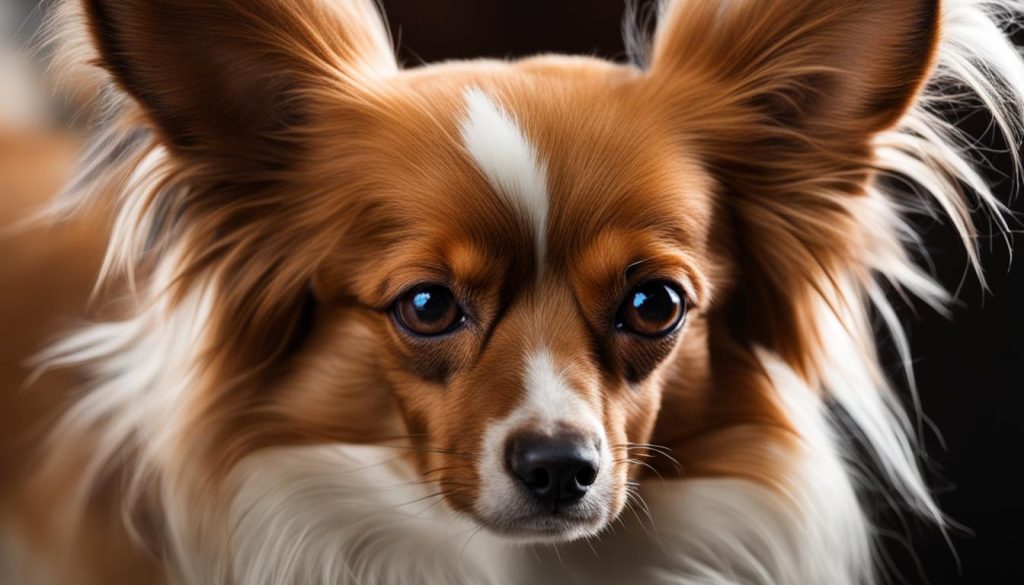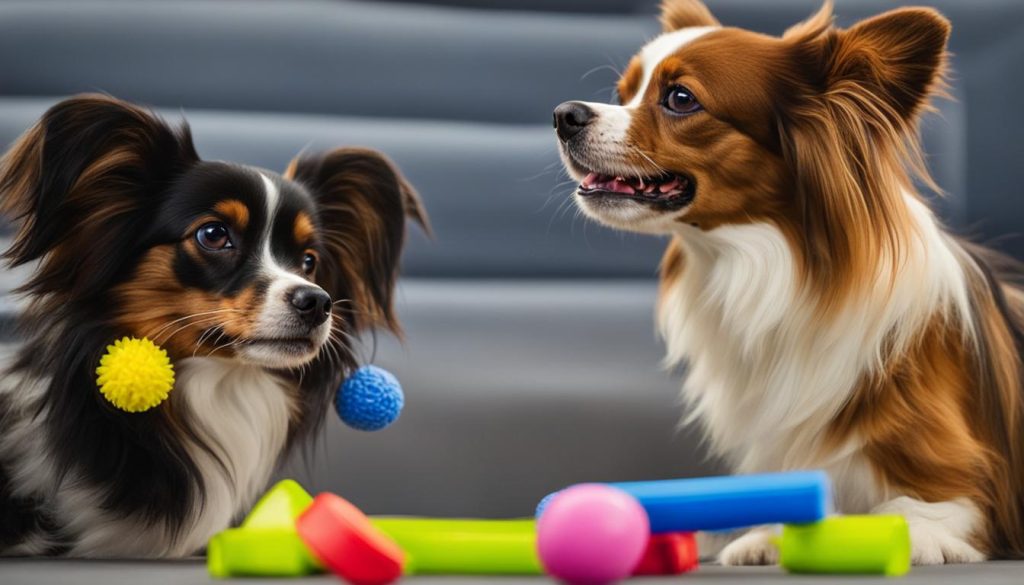Hello there, fellow pet parents! Are you ready to embark on an exciting training journey with your Papillon? These adorable little dogs with their butterfly-like ears are not only beautiful to look at but also highly intelligent and eager to please. In this article, I will share with you some valuable tips and techniques for effective Papillon training using positive reinforcement.
Papillons are known for their agility and friendly nature, making them a delight to train. Whether you’re a novice or a seasoned dog owner, these tips will help you train your Papillon to be a well-behaved and obedient companion. So let’s dive in and discover the secrets to successful Papillon training!
Papillon Training
- Use positive reinforcement techniques for effective Papillon training
- Be consistent and patient with your training efforts
- Engage your Papillon in daily physical and mental exercises for stimulation
- Consider enlisting the help of a professional Papillon trainer for expert guidance
- Enjoy a variety of activities like walking, playing, obedience training, and agility with your Papillon
Caring for a Papillon
When it comes to taking care of your Papillon, grooming plays a crucial role in maintaining their health and appearance. Regular grooming sessions and proper care for their coat, skin, eyes, ears are essential.
Papillon Grooming
Papillons have a beautiful, long, silky coat that requires frequent brushing to keep it looking its best. Regular brushing helps remove debris and tangles, preventing matting. Aim to brush your Papillon’s coat daily to keep it clean, healthy, and free from any discomfort.
In addition to brushing, regular bathing is necessary to keep their coat and skin in optimal condition. Monthly bathing is recommended, using a mild dog shampoo, followed by thorough drying to prevent skin irritation. Ensure you dry your Papillon’s coat completely, especially in the areas where moisture can accumulate.
Papillon Eye Care
Eyes are sensitive organs for any dog, including Papillons. Therefore, routine cleaning of their eyes is vital to maintain their health and prevent any issues. Use a soft, damp cloth or cotton ball to gently wipe away any discharge or debris around their eyes. Be cautious and avoid getting any cleaning solution directly in their eyes, as it may cause discomfort.
Papillon Ear Care
Regular cleaning of your Papillon’s ears helps prevent wax buildup and reduces the risk of ear infections. Use a veterinarian-approved ear cleaner or a damp cloth to wipe the outer portion of their ears. Avoid inserting anything into their ear canal, as it can damage their delicate ear structures.
By following these grooming tips and incorporating regular care, you can help keep your Papillon looking and feeling their best. Grooming not only enhances their appearance but also contributes to their overall well-being.
Papillon Health Issues
Papillons are generally a healthy breed, but it’s important for pet owners to be aware of potential health issues that may affect their furry companions. Key health concerns that Papillon owners should be mindful of include open fontanelle, luxating patella, dental disease, and hypoglycemia.
Open Fontanelle
Open fontanelle is a condition often seen in toy or small-breed puppies, where the soft spot in the skull fails to close properly. While open fontanelle usually doesn’t cause any major problems, it can potentially increase the risk of brain injury. It’s important for owners to handle their Papillon puppies with care to prevent any accidental head injuries.
Luxating Patella
Luxating patella is another health issue that can affect Papillons. This condition occurs when the kneecap pops in and out of place, causing discomfort and pain. In more severe cases, surgical correction may be necessary to alleviate the problem and improve the dog’s quality of life.
Dental Disease
Papillons, being a toy breed, are also prone to dental disease. Regular dental care is essential to prevent periodontal issues, such as plaque buildup, gum infections, and tooth loss. Pet owners should establish a dental hygiene routine for their Papillons, including regular brushing, dental chews, and annual dental cleanings by a veterinarian.
Feeding and Hypoglycemia
Proper feeding and portion control play a vital role in maintaining the overall health of Papillons. These small dogs are prone to hypoglycemia, a condition characterized by low blood sugar levels. To prevent hypoglycemic episodes, it’s recommended to feed them small, frequent meals throughout the day. Owners should provide a balanced diet that meets the nutritional needs of their Papillons, consulting with a veterinarian if necessary to ensure the right feeding plan.
By being aware of these potential health issues and taking proactive measures, Papillon owners can help their furry friends lead happy and healthy lives.

Behavior and Training Tips for Papillons
Papillons are intelligent and active dogs that require mental stimulation and training. Whether you’re a new papillon owner or looking to improve your Papillon training techniques, these behavior and training tips will help you develop a well-behaved and happy companion.
- Papillon behavior training: Positive reinforcement is the key to effectively train your papillon. Reward good behavior with treats, praise, or playtime to encourage desired actions and discourage unwanted behaviors.
- Papillon training classes: Consider enrolling your papillon in professional training classes. These classes provide structured training sessions and socialization opportunities, allowing your papillon to learn from experienced trainers and interact with other dogs.
- Papillon training guide: Utilize a comprehensive training guide to understand and implement various training techniques. A well-structured guide will cover obedience training, command training, and crate training, among other essential aspects of papillon training.
- Papillon potty training: Potty training can be a challenge, but with consistency and positive reinforcement, you can successfully train your papillon to eliminate in designated areas. Establish a routine, reward successful bathroom trips, and be patient during the process.
- Papillon leash training: Leash training is crucial to ensure your papillon’s safety during walks. Start by introducing your papillon to the leash gradually and reward them for walking calmly beside you. Teach basic commands like “heel” and practice walking in various environments.
- Papillon socialization: Socialization is essential for papillons to develop good manners and adapt to different environments. Expose your papillon to various people, animals, and situations from an early age, offering positive experiences and rewards for appropriate behavior.
Remember to be patient and consistent in your Papillon training efforts. Papillons thrive on positive interactions and enjoy participating in activities such as walking, playing, obedience training, and agility. With the right training approach and ample socialization, your papillon will become a well-rounded and well-behaved companion.

Papillon Grooming Guide
Grooming is an essential part of caring for a Papillon’s beautiful long coat. Regular maintenance helps prevent tangles, debris, and skin irritations, keeping your Papillon healthy and looking their best. Here are some grooming tips to keep in mind:
- Papillon Coat Care: Papillons have a silky coat that requires regular brushing to prevent tangles and remove debris. Brush their coat at least a few times a week to keep it clean and free from mats.
- Papillon Skin Care: The skin of Papillons is generally low maintenance, but regular brushing helps stimulate blood circulation and prevents skin infections. Take care to brush gently, avoiding any harsh pulling or tugging.
- Papillon Eye Care: Routine cleaning of the eyes is crucial to prevent tear buildup and potential eye infections. Use a soft, damp cloth or a specifically formulated eye cleanser to gently wipe away any discharge or debris.
- Papillon Ear Care: Clean their ears regularly to avoid ear infections. Wipe the inner ear flaps using a gentle, vet-recommended ear cleaning solution and a soft cloth. Be cautious not to insert anything into the ear canal.
Monthly bathing is also necessary to maintain a healthy coat and prevent skin irritations. Use a mild shampoo formulated for dogs and ensure thorough drying after each bath.
Conclusion
After exploring various aspects of owning a Papillon, it is clear that training and socialization are crucial for these intelligent and active dogs. Positive reinforcement techniques, such as reward-based training, yield the best results in shaping their behavior. Consistency and patience are key when it comes to papillon training tips.
In addition to training, regular grooming is essential to maintain a healthy coat and prevent skin issues. With their long, silky hair, Papillons require frequent brushing and monthly professional grooming sessions. This not only keeps them looking their best but also helps prevent tangles and debris buildup. Routine cleaning of the eyes and ears is also important to maintain their overall health and prevent infections.
While Papillons are generally a healthy breed, it’s important to be aware of potential health issues. Conditions such as open fontanelle and luxating patella can be problematic. Regular veterinary check-ups and proper dental care are also essential to ensure their well-being.
With their intelligence and active nature, Papillons thrive with mental and physical stimulation papillon behavior training. Providing them with engaging activities like obedience training and agility exercises not only keeps them physically fit but also strengthens the bond between the dog and the owner. With proper training, care, and attention, Papillons can be well-behaved and loving companions for eager pet parents.
FAQ
What is the best method to train a Papillon?
Positive reinforcement is the most effective training method for Papillons. Rewarding good behavior with treats, praise, and playtime will motivate and encourage your Papillon to learn and obey commands.
How can I potty train my Papillon?
Potty training can be challenging, but consistency is key. Take your Papillon outside frequently, especially after meals and naps, and reward them with praise and treats when they eliminate in the designated area. Accidents should be calmly cleaned up without punishment.
Are Papillons easy to train?
Yes, Papillons are intelligent and eager to please, making them highly trainable. They excel in obedience and agility training and are quick to learn new commands and tricks.
How important is socialization for a Papillon?
Socialization is crucial for Papillons to help them adapt to new situations and people. Expose your Papillon to a variety of environments, animals, and people from a young age to ensure they grow into well-adjusted and confident adults.
How often should I brush my Papillon’s coat?
Papillons have a long, silky coat that requires frequent brushing to prevent tangles and debris. Daily brushing is recommended to keep their coat healthy and free of mats.
How often should I bathe my Papillon?
Papillons should be bathed monthly to keep their coat clean and their skin healthy. Use a mild dog shampoo and ensure they are thoroughly dried after each bath to prevent skin irritation.
How do I care for my Papillon’s eyes and ears?
Routine cleaning of the eyes with a damp cloth and checking the ears regularly for any signs of infection or buildup are important to maintain your Papillon’s eye and ear health. Consult with a veterinarian for safe and proper cleaning techniques.
What are the common health issues for Papillons?
While Papillons are generally a healthy breed, there are some potential inherited conditions to be aware of. These include open fontanelle, a condition where the soft spot in the skull does not close properly, and luxating patella, where the kneecap pops in and out of place. Dental disease is also common in toy breeds like Papillons.
How should I feed my Papillon?
Feeding and portion control are important to maintain a healthy weight and prevent obesity in Papillons. It is recommended to provide them with small, frequent meals to prevent hypoglycemia, which they are prone to during puppyhood. Consult with your veterinarian for a balanced diet plan.
Is grooming necessary for Papillons?
Yes, grooming is necessary for Papillons to keep their coat healthy and prevent skin issues. Regular brushing, monthly professional grooming, and routine cleaning of the eyes and ears are important aspects of Papillon care.
Are Papillons good with children?
Yes, Papillons are generally good with children when properly socialized and trained. They are friendly and playful, but as with any dog, interactions between Papillons and children should always be supervised to prevent accidents.
Can Papillons adapt to apartment living?
Yes, Papillons are adaptable to apartment living as long as they receive enough daily physical and mental stimulation. They enjoy walks, playtime, and training sessions, making them suitable for various living environments.






